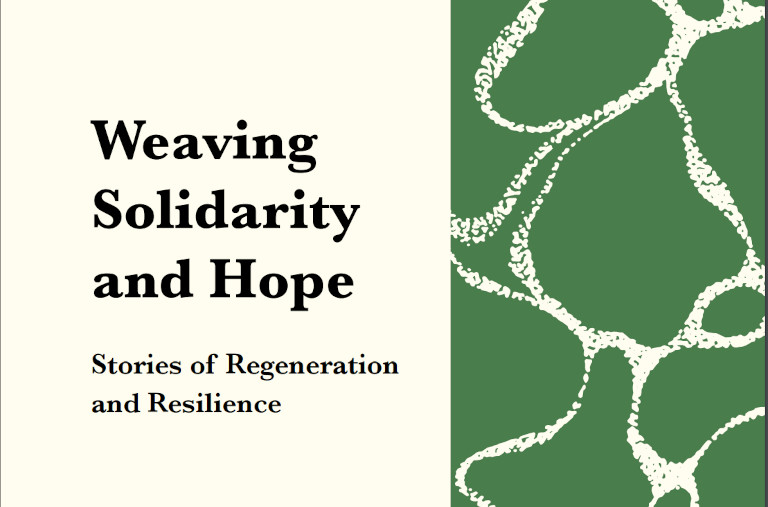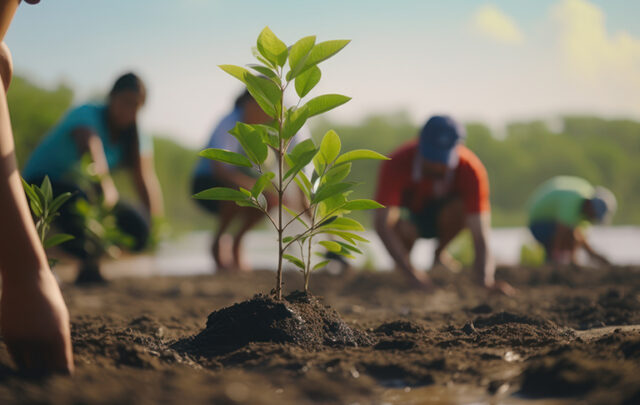Introduction
“People who are resisting as an everyday act of resistance against injustice, oppression, patriarchy, occupation, is a beautiful act of humanity”
says Dr. Abdelfattah Abusrour from Palestine.
This volume contains seven stories of resistance, resilience and regeneration across the world that highlight how peoples proactive responses to the multiple crises the world faces—ecological, socio-cultural, political, economic, spiritual—are widespread and diverse. These stories thread expressions of varied possibilities of defining and organising social life beyond the oppressive structures of capitalism, patriarchy, extractive development, war & conflicts, and commodification of human and natural lives. These stories are lived realities of people from Indigenous Peoples and other rural communities, from urban neighborhoods, from both the Global South and Global North, from both marginalized sections and the privileged elite.
But why is it important to highlight and amplify these stories? What do they offer in efforts to transform the world? We at Global Tapestry of Alternatives believe that what these stories offer is a possibility, a possibility that already exists in real life. A possibility of organising lives beyond capitalist modernity. A possibility that is acutely threatened but also actively looked for. The Covid pandemic exposed the deep fault lines of the dominant systems. While the immediate humanitarian crisis was visible and generated widespread spontaneous initiatives by civil society and by several governments to provide relief, much less common were attempts to address root structural causes. It is vital that we accelerate this opportunity to simultaneously rethink the economic, social, political, cultural and ecological approaches to life. We need to urgently find alternative pathways of well-being that help generate dignified livelihoods for all and that help us move towards rebuilding our ecological relationship with and within nature.
Our earlier two volumes showed how communities across the world in the most desperate situations responded to the crises with resilience, care, innovation, and adaptability.
This volume brings stories of communities resisting and building transformative alternatives in conflict regions, war zones, exploitation, suppression and violence, all manifested in varied forms. Our first story from Palestine brings the struggle of organising and resisting in one of the world’s most conflict ridden regions and describes “Beautiful Resistance,” which uses culture, art, and education to resist injustice, oppression, and occupation. Our next story is from Ukraine – while at the time of writing of this editorial, it has been 480 days of war and invasion, there have been regional feminist responses to the Russian invasion of Ukraine.
Download it
Here you can download the PDF version of the report
We at Global Tapestry of Alternatives believe that what these stories offer is a possibility, a possibility that already exists in real life. A possibility of organising lives beyond capitalist modernity. A possibility that is acutely threatened but also actively looked for.
They are building on humanitarian and human rights crises, as well as crises of democracy, economy, care, and future visioning beyond survival. Another story is of how communities in Balkans and in Europe are resisting and organising to stop military plans and insist on developing a positive alternative for their territory- Sinjajevina (Montenegro)— one of the largest communal pasturelands of the continent.
Our next story comes from the Philippines, highlighting the resilience and regeneration of Sitio San Roque urban poor community, currently home to more than 6,000 families. The story brings out the power of community-led initiatives when solidarity and collective action are put into practice by marginalized peoples, especially when these are met with recognition and support from the government. Another story comes from one of the most violent cities in the world, São Paulo in Brazil. It tells about an experimental collective space UniDiversidade that nurtures local wisdom and practices for the development of young people, helps foster livelihood opportunities for them, and strengthens community bonds and collectivisation through art. Similarly, in Thailand, communities are resisting the destruction of their traditional livelihoods by creating systems of forest management & biodiversity by reviving traditional ways of farming.
Our last story comes from West Africa, where communities in Benin by protecting their sacred forests, reviving traditional practices of conviviality, and tending to land are combating results of systemic crises such as food insecurity, loss of forests, loss of livelihoods, and climate change.
These resistances and alternatives are emerging under grave threats by authoritarian states, corporations and other destructive processes unleashed by neoliberal, growth-at-all-costs “development”, and continuing forms of patriarchy, racism, and colonialism. It is not easy for these movements to survive, let alone thrive. However, what we also see is the resurgence of life, and acts of solidarity, cooperation, love, autonomy, and care in all these examples. This spirit circulates among many grassroots expressions of collectives and networks, as dignified rage against systems of oppression as well as the affirmation of their resolve to defend their dignity by articulating a pluriverse of alternatives.
These stories located in varied contexts have commonalities. It is in their shared resistance to mainstream forces and policies that these initiatives can be called “alternatives” (though many in their own traditional contexts would be part of everyday life). These movements are based on a foundation of values and ethics, including solidarity, interconnectedness, cooperation, diversity and pluralism, autonomy, rights with responsibilities, mutual respect, equality, non-violence, and peace.
Storytelling is an important act of decolonization and disrupting the dominant stuck systems. With this hope, we share these stories, realising that it is important to read, share, and learn from them. It is crucial in these times that we constructively challenge each other, offer active solidarity whenever needed, interweave the initiatives in common actions, and support the conditions for the radical systemic changes we need. More than ever, we need to work together and stand in solidarity with each other’s resistances and re-constructions.
Credits
This document has been coordinated and put together by Shrishtee Bajpai, Urvi Shah and Mugdha Trifaley with support from members of GTA core team members.
Design and Layout by: Urvi Shah
Illustrations by: Akanksha Bhushan






